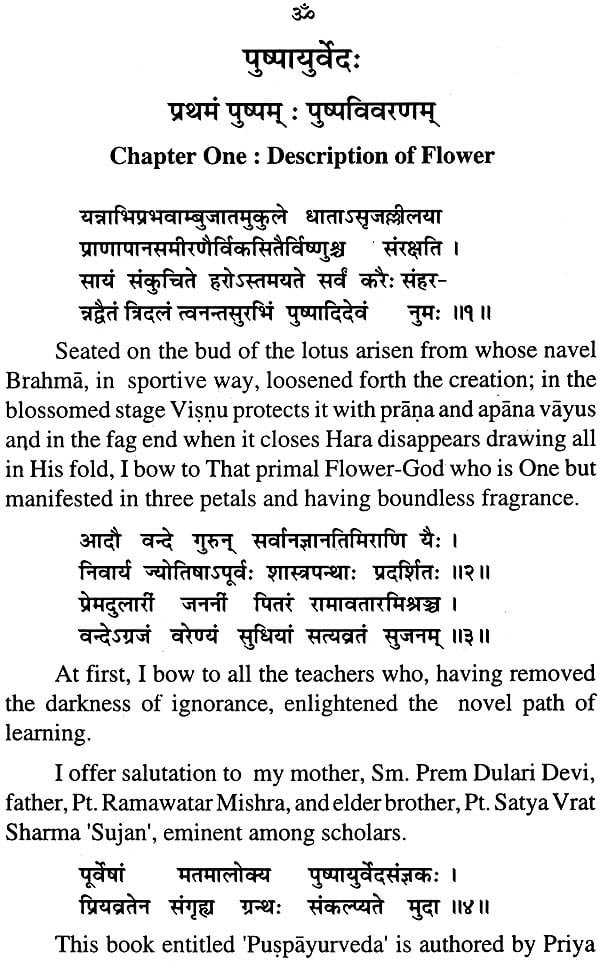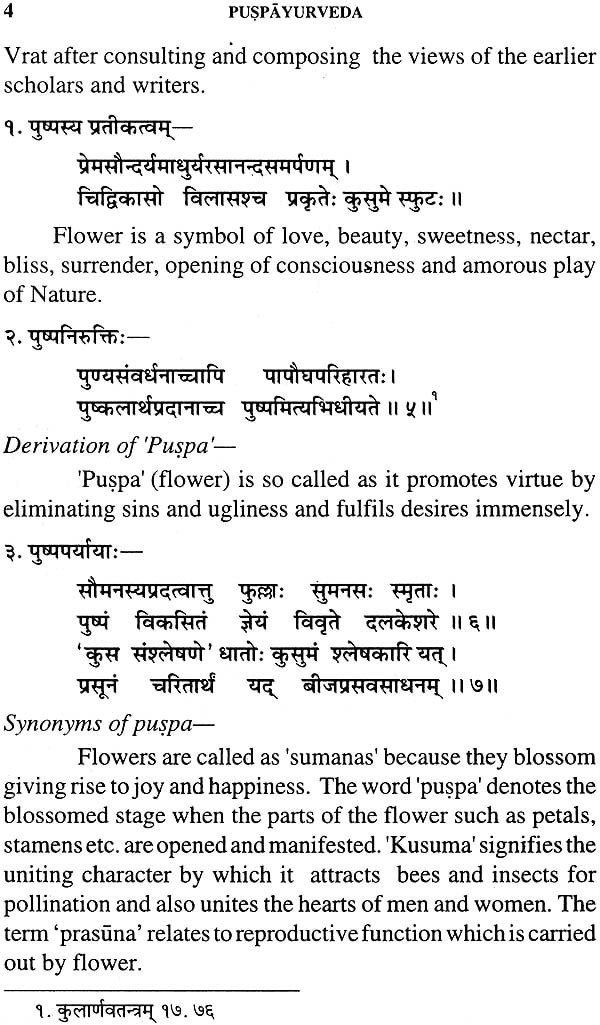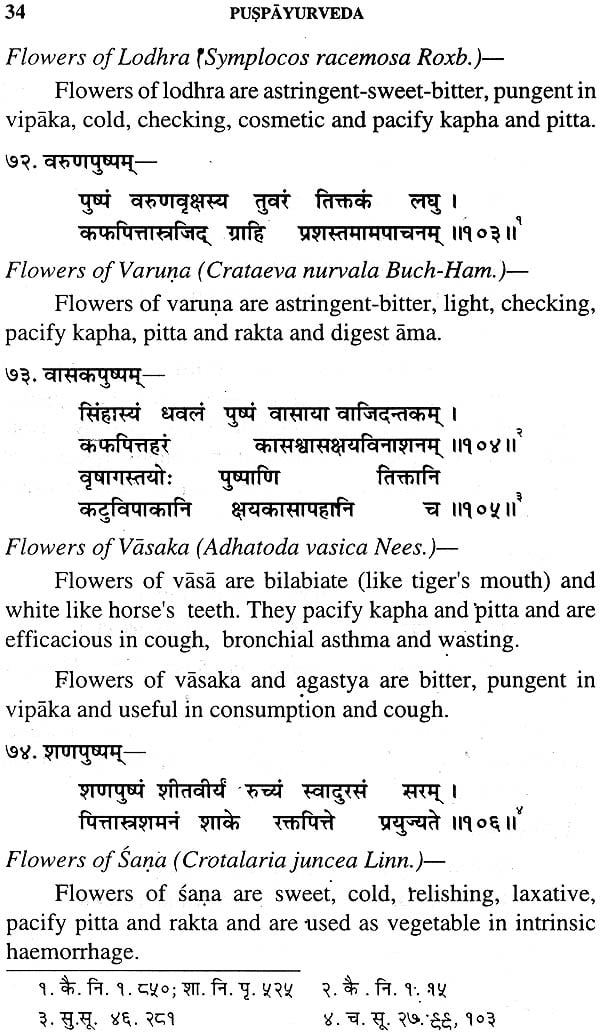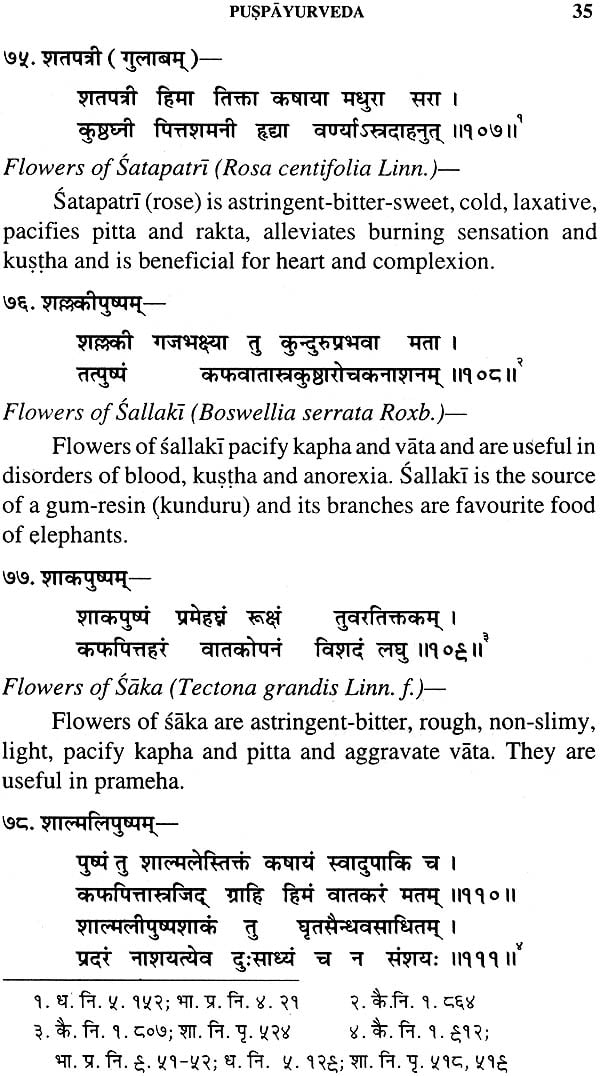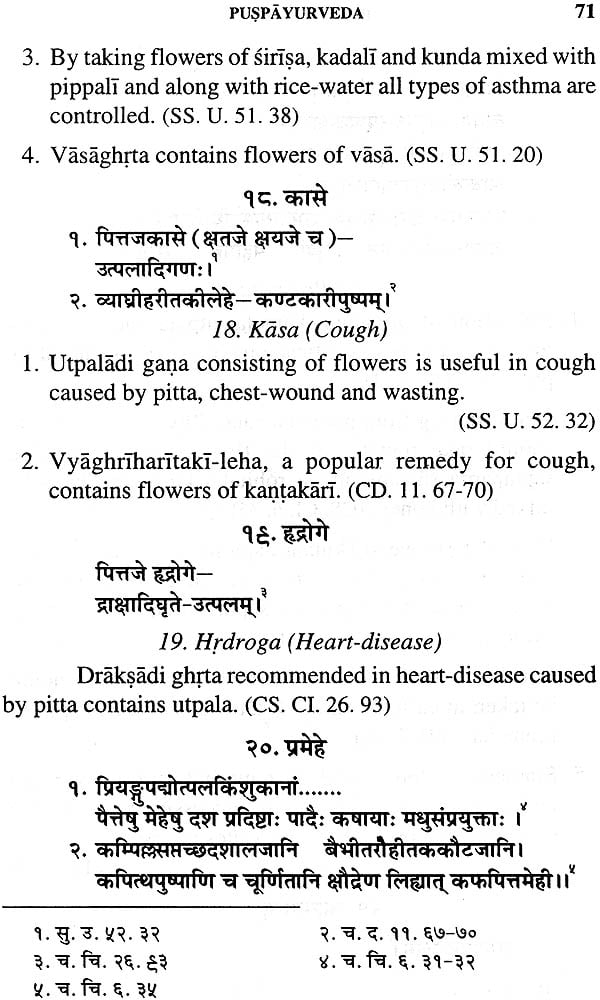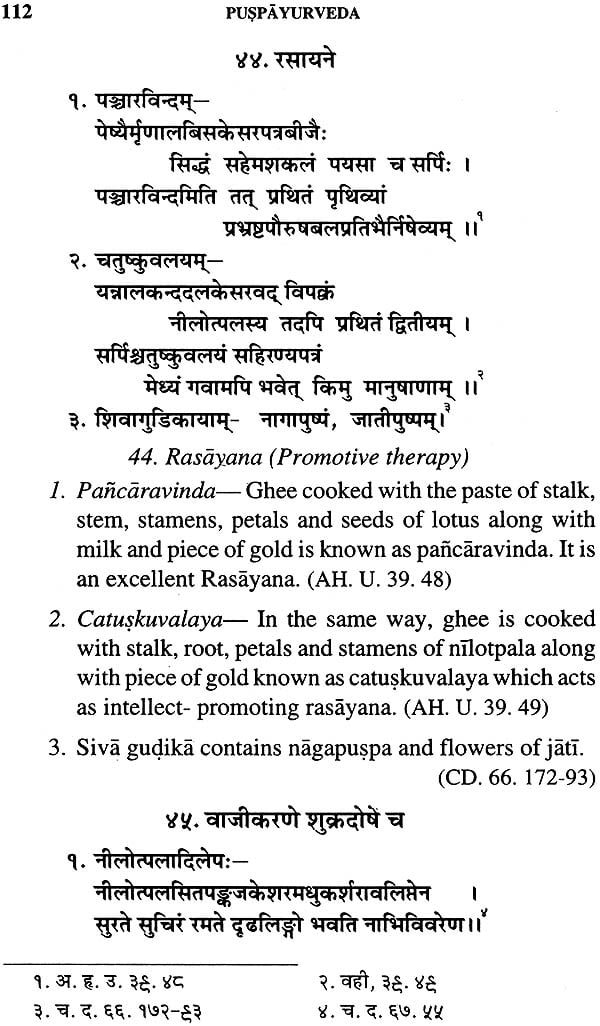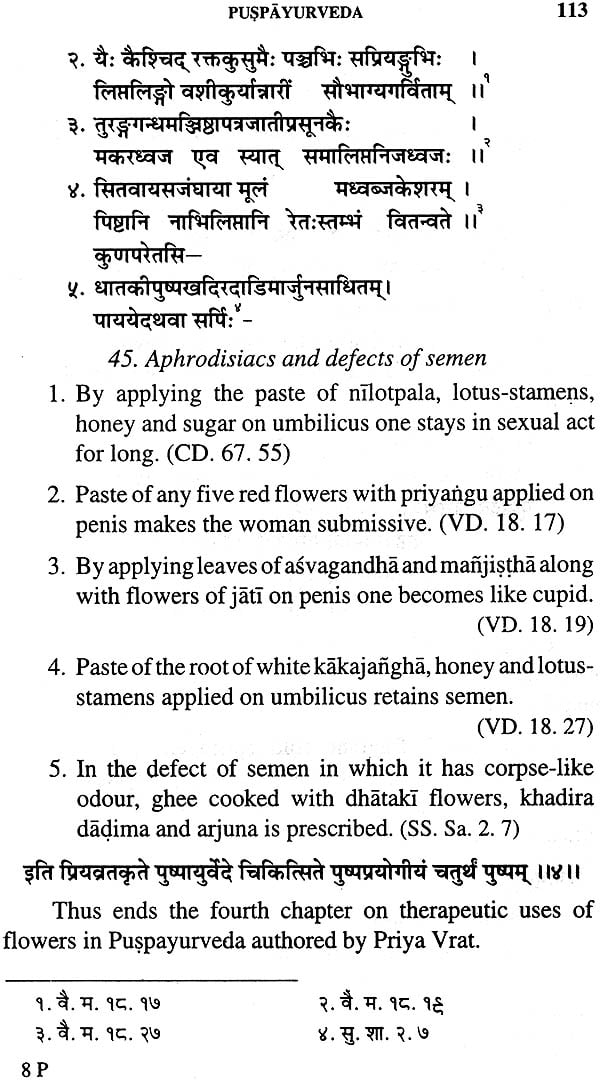
Puspayurvedah (Flowers in Health and Disease)
Book Specification
| Item Code: | NAI409 |
| Author: | P.V.Sharma |
| Publisher: | Chaukhambha Visvabharati , Varanasi |
| Language: | Sanskrit Text With English Language |
| Edition: | 2015 |
| ISBN: | 9789381301685 |
| Pages: | 144 |
| Cover: | Paperback |
| Other Details | 9 inch X 5.5 inch |
| Weight | 300 gm |
Book Description
This is the latest work of Prof. Sharma which deals with flowers of various plants and their role in health and disease. The text in sanskrit is followed by English translation by the author.
The subject matter is divided into the following five chapters:
1. General description of flowers.
2. Properties and actions of flowers.
3. Use of flowers in health.
4. Therapeutic uses of flowers.
5. Preparations of flowers.
Thus it opens a new vista in the study of Dravyaguna (medicinal plants) highlighting the practical importance of a particular part which is the most beautiful and attractive one. The book would be useful for all those who love flowers and realise their affinity with life apart from the physicians and scientists who would utilise them in different conditions.
Prof. P. V. Sharma is well known for his valuable contributions in the field of Ayurveda. During the last five decades he has written in various aspects of Ayurveda-literary as well as scientific, conceptual as well as historical.
Born on 1st November, 1920, in a small village near Patna, in the family of traditional vaidyas he gradually acquired highest degree in Ayurveda, Sanskrit and Hindi and held highest posts in academic and administrative fields. In Bihar, he was, for many years, Principal of the Govt. Ayurvedic college, and Dy. Director of Health Services (I.M.). Finally, he was appointed as Professor of Dravyaguna, also as Head, and later Director of the Postgraduate Institute of Indian Medicine, also Dean of the Faculty of Indian Medicine in the Banaras Hindu University. He retired in 1980.
Prof. Sharma has been participating in international conferences abroad and has been associated with several committees on Ayurveda on national level. He has authored 40 books and has about 450 published papers to his credit.
Flower is the most attractive part of the plant which bewitches with its beautiful harmony, colours and fragrance. It symbolises blossoming of universal consciousness and the smile of spirit hidden in Nature. This is the reason why flowers occupy an important place in individual and social life. Poets pour their emotional outburst and fine expressions on the charming apperance of flowers and that is why have honoured spring as the king of seasons (Rturaja) and friend and associate of Love-god (Kama).
The Mother was very fond of flowers so much so that often she identified herself with them. She realised their blooming as her own smile. She also discovered spiritual significance of flowers and labelled each flower with specific name based on the quality which they represented. She has also indicated, at some places, use of flowers in ailments.
In Ayurveda, flowers have distinct place and are used in health and disease from time immemorial. It is learnt that there was some text on Puspayurveda. In introductory remarks the editor, Pt. V. P. Shastri, of the Kalyanakaraka by Ugradityacarya (pub. Sholapur, 1940) informs that there was a text entitled 'Puspayurveda' which contained the use of flowers of eighteen thousand species and varieties and a manuscript of which is available in Kannada script. He also relates it to Samantabhadra, a renowned Jaina scholar, who preceded Pujyapada (pp. 37-38). This is the only source of information on which several articles are published by different authors but I think nobody has seen the text (including myself) and exact informations on the manuscript are still lacking.
Nevertheless, the topic is interesting and it evidently shows the importance of flowers in relation to health and disease. With this view, I took up this work and collected relevant material from the Ayurvedic texts giving the shape of a book now in your hands.
The present text is divided into five chapters. The first chapter deals with description of the parts of flower and other general informations thereon. The second chapter contains properties and actions of different flowers as described in nighantus and other texts. The use of flowers in health and daily life has been given in the third chapter. The fourth chapter contains therapeutic uses of flowers in different disease-conditions. On overall observation it would be evident that flowers, as they are delicate and soothing, are useful mostly in aggravation of pitta, intrinsic haemorrhage, eye diseases and poisoning. The fifth and the last chapter describes die various pharmaceutical forms in which flowers are used.
The text is translated into English giving the Latin names of the flowering plants in the relevant chapter.
I have tried my best to represent and reconstruct the Puspayurveda which may serve as the ground work for the scholars working in this field.
I bow to the Mother with all numble offerings by whose divine inspiration this work was made possible.
I extend my hearty thanks and best wishes to Dr. Pravina Chandra Pathak of Barauni for supplying the photograph. I am also thankful to the publishers for bringing out this book in a nice form.
| Chapter One: Description of flower | |||
| 1 | Introductory verses | 3 | |
| 2 | Derivation of 'Puspa' | 4 | |
| 3 | Synonyms of 'Puspa' | 4 | |
| 4 | Stages of flower | 5 | |
| 5 | Parts of flower | 6 | |
| 6 | Variations of shape, colour etc. in flowers | 6 | |
| 7 | Flowering time | 7 | |
| 8 | Collection of flowers | 8 | |
| 9 | Flower as one of the five parts | 8 | |
| 10 | Toxicity in some flowers | 8 | |
| 11 | Five poisonous flowers | 8 | |
| 12 | Symptoms of poisoned flowers and their treatment | 9 | |
| Chapter Two: Properties and actions of flowers | |||
| 1 | Flowers in groups (ganas) of drugs | 11 | |
| 2 | Agastya (Sesbania grandiflora Pers.) | 13 | |
| 3 | Agnimantha (Premna mucronata Roxb.) | 13 | |
| 4 | Atimuktaka (Hiptage benghalensis Kurz.) | 13 | |
| 5 | Amlika (Tamarandus indica Linn.) | 13 | |
| 6 | Arka (Calotropis procera (Ait) R. Br. | 14 | |
| 7 | Alarka (Calotropis gigantea (Linn.) R.Br. ex Ait | 14 | |
| 8 | Asoka (Saraca asoka Roxb. De wilde. | 14 | |
| 9 | Asana (Pterocarpus marsupium Roxb.) | 15 | |
| 10 | Amra (Mangifera indica Linn.) | 15 | |
| 11 | Aragvadha (Cassia fistula Linn.) | 15 | |
| 12 | Avarttaki (Cassia auriculata Linn.) | 16 | |
| 13 | Ingudi (Balanites aegyptiaca (Linn.) Delile.) | 16 | |
| 14 | Utpala | ||
| (A) Kumuda (Nymphaea nouchali Burm. f.) | 16 | ||
| (B) Nilotpala (Nymphaea stellata Willd.) | 17 | ||
| 15 | Eranda (Ricinus communis Linn.) | 17 | |
| 16 | Kadamba (Anthocephalus indicus Miq.) | 17 | |
| 17 | Kadali (Musa paradisiaca Linn.) | 18 | |
| 18 | Kapittha (Feronia limonia (Linn.) Swingle.) | 18 | |
| 19 | Kamala (Nelumbo nucifera Gaertn.) | 19 | |
| 20 | Karira (Capparis decidua Edgew.) | 19 | |
| 21 | Kaficanara (Bauhinia variegata Linn.) | 20 | |
| 22 | Kovidara (Bauhinia purpurea Linn.) | 20 | |
| 23 | Kasamarda (Cassia occidentalis LInn.) | 20 | |
| 24 | Kunkuma (Crocus sativus Linn.) | 20 | |
| 25 | Kutaja (Holorrhena antidysenterica (Linn.) Wall.) | 21 | |
| 26 | Kunda (Jasminum multiflorum Andr.) | 21 | |
| 27 | Kubjaka (Rosa moschata Herrm.) | 21 | |
| 28 | Kumari (Aloe vera Toum ex Linn.) | 22 | |
| 29 | Kurantaka (Barleria prionitis Linn.) | 22 | |
| 30 | Ketaki (Pandanus odoratissimus Roxb.) | 22 | |
| 31 | Khatmi (Althoea officinalis Linn.) | 22 | |
| 32 | Gambhari (Gmelina arborea Linn.) | 22 | |
| 33 | Campaka (Micheli a champaka Linn.) | 23 | |
| 34 | Japa (Hibiscus rosa-sinensis Linn.) | 23 | |
| 35 | Jati (Jasminun officinale Linn.) | 23 | |
| 36 | Jivanti (Leptadenia reticulata W. & A.) | 24 | |
| 37 | Jufa (Hyssopus officinalis Linn.) | 24 | |
| 38 | Jhandu (Tagetes erecta Linn.) | 24 | |
| 39 | Tala (Borassus flabellifer Linn.) | 24 | |
| 40 | Tilaka (Wendlandia exerta DC.) | 25 | |
| 41 | Tulasi (Ocimum sanctum Linn.) | 25 | |
| 42 | Trayamana (Gentiana kurroo Royle.) | 25 | |
| 43 | Dadima (Punica granatum Linn.) | 25 | |
| 44 | Dhataki (Woodfordia fruticosa Kurz.) | 26 | |
| 45 | Nagapuspa (Mesua ferrea Linn.) | 26 | |
| 46 | Narikela (Cocos nucifera Linn.) | 26 | |
| 47 | Nimba (Azadirachta indica A. Juss.) | 27 | |
| 48 | Nirgundi (Vitex negundo Linn.) | 27 | |
| 49 | Nilini (Indigofera tinctoria Linn.) | 27 | |
| 50 | Nepali (Jasminum sp.) | 28 | |
| 51 | Panasa (Artocarpus heterophyllus Lam.) | 28 | |
| 52 | Palasa (Butea monosperma (Lam.) Kuntze) | 28 | |
| 53 | Patala (Stereospermum suaveolens DC.) | 28 | |
| 54 | Paribhadra (Erythrina indica Linn.) | 29 | |
| 55 | Punnaga (Calophyllum inophyllum Linn.) | 29 | |
| 56 | Priyangu (Callicarpa macrophylla Vahl.) | 29 | |
| 57 | Bakula (Mimusops elengi Linn.) | 30 | |
| 58 | Badara (Zizyphus jujuba Lam.) | 30 | |
| 59 | Banafsa (Viola odorata Linn.) | 30 | |
| 60 | Bandhiika (Pentapetes phoenicea Linn.) | 30 | |
| 61 | Bimbi (Coccinia indica W. & A.) | 31 | |
| 62 | Bilva (Aegle marmelos Corr.) | 31 | |
| 63 | Madhiika (Madhuca indica J. F. Gmel.) | 31 | |
| 64 | Mallika (Jasminum sambac Ait.) | 32 | |
| 65 | Matulunga (Citrus medica Linn.) | 32 | |
| 66 | Mucakunda (Pterospermum acerifolium Willd.) | 32 | |
| 67 | Muskaka (Schrebera swietinioides Roxb.) | 32 | |
| 68 | Miilaka (Raphanus sativus Linn.) | 33 | |
| 69 | Yuthika (Jasminum auriculatum Vahl.) | 33 | |
| 70 | Lavanga (Syzygium aromaticum (Linn.) Merr. & Per.) | 33 | |
| 71 | Lodhra (Symplocos racemosa Roxb.) | 34 | |
| 72 | Varuna (Crataeva nurvala Buch-Ham.) | 34 | |
| 73 | Vasaka (Adhatoda vasika Nees.) | 34 | |
| 74 | Sana (Crotalaria juncea Linn.) | 34 | |
| 75 | Satapatri (Rosa centifolia Linn.) | 35 | |
| 76 | Sallaki (Boswellia serrata Roxb.) | 35 | |
| 77 | Saka (Tectona grandis Linn. f.) | 35 | |
| 78 | Salmali (Bombax ceiba Linn.) | 36 | |
| 79 | Sigru (Moringa oleifera Lam.) | 36 | |
| 80 | Madhusigru (Moringa concanensis Nimmo.) | 36 | |
| 81 | Slesmataka (Cordia dichotonia Forst. f.) | 36 | |
| Chapter Three: Uses of flowers in Health | |||
| 1 | Flowers garden and Park | 37 | |
| 2 | Interior decoration | 37 | |
| 3 | Flower among eight auspicious objects | 38 | |
| 4 | Anutaila | 38 | |
| 5 | Aromatic shampoo | 38 | |
| 6 | Head-oil | 39 | |
| 7 | Worship of gods | 39 | |
| 8 | Offering to siddhas | 40 | |
| 9 | Cosmetic pastes and powders | 40 | |
| 10 | 10.Paste after bath | 41 | |
| 11 | Scenting clothes | 42 | |
| 12 | Wearing flowers and garlands | 42 | |
| 13 | Method of wearing flowers | 43 | |
| 14 | Wearing flowers according to seasons | 43 | |
| 15 | Period of wearing flowers | 44 | |
| 16 | Forbidden garlands | 45 | |
| 17 | Flowers in dining room | 45 | |
| 18 | Wearing garland while taking food | 45 | |
| 19 | Flowers in diet | 46 | |
| 20 | Scenting water with flowers | 46 | |
| 21 | Smoking stick | 46 | |
| 22 | Flowers as aphrodisiac | 47 | |
| 23 | In ritual for conception | 47 | |
| 24 | In seasonal regimen | 48 | |
| 25 | In samskaras (rites) | 48 | |
| 26 | In social gatherings | 48 | |
| 27 | In welcoming guests and offering presents | 49 | |
| 28 | Entertainment and sports | 49 | |
| 29 | Flowers as dye | 49 | |
| Chapter Four: Therapeutic uses of flowers | |||
| 1 | Fever | 52 | |
| 2 | Fever with diarrhoea | 54 | |
| 3 | Diarrohea | 55 | |
| 4 | Grahani disorder | 57 | |
| 5 | Piles | 59 | |
| 6 | Gulma (Abdominal lump) | 60 | |
| 7 | Helminthiasis | 60 | |
| 8 | Jaundice | 60 | |
| 9 | Disorders of agni (Digestion) | 61 | |
| 10 | Anorexia & excessive salivation | 61 | |
| 11 | Vomiting | 62 | |
| 12 | Thirst | 62 | |
| 13 | Udara (Abdominal enlargement) | 63 | |
| 14 | Raktapitta (Internal haemorrhage) | 66 | |
| 15 | Consumption | 69 | |
| 16 | Wasting due to chest-wound | 70 | |
| 17 | Bronchial asthma | 70 | |
| 18 | Cough | 71 | |
| 19 | Heart-disease | 71 | |
| 20 | Prameha | 72 | |
| 21 | Calculus | 73 | |
| 22 | Dysuria | 73 | |
| 23 | Leprosy | 74 | |
| 24 | Erysepelas | 75 | |
| 25 | Eruptive boils | 76 | |
| 26 | MInor diseases | 78 | |
| 27 | Vatavyadhi | 80 | |
| 28 | Vatarakta | 80 | |
| 29 | Insanity | 81 | |
| 30 | Alcoholism | 82 | |
| 31 | Fainting | 83 | |
| 32 | Excessive sleep | 84 | |
| 33 | Head-diseases | 85 | |
| 34 | Diseases of mouth | 87 | |
| 35 | Diseases of teeth | 87 | |
| 36 | Diseases of eye | 91 | |
| 37 | Scrotal enlargements | 95 | |
| 38 | Soft chancre | 95 | |
| 39 | Wound | 96 | |
| 40 | Diseases of women | 98 | |
| 41 | Diseases of children | 103 | |
| 42 | Poisons | 108 | |
| 43 | Evacuative therapy | 111 | |
| 44 | Rasayana | 112 | |
| 45 | Aphrodisiacs and defects of semen | 113 | |
| Chapter Five : Pharmaceutical forms of flowers | |||
| 1 | Flower-juice | 114 | |
| 2 | Powder | 115 | |
| 3 | Cold infusion | 115 | |
| 4 | Hot infusion | 115 | |
| 5 | Paste | 115 | |
| 6 | Linctus | 116 | |
| 7 | Asava | 116 | |
| 8 | Oil | 117 | |
| 9 | Inhaling Preparations | 117 | |
| 10 | Arka (Distilled extract) | 118 | |
| 11 | Scents | 118 | |
| 12 | Flower-electuary | 119 | |
| Dietary Preparations | |||
| 13 | Soups | 119 | |
| 14 | Vegetable | 120 | |
| 15 | Syrup | 120 | |
| 16 | Sara (A soury preparation) | 121 | |
| 17 | Vegetable curry | 121 | |
| 18 | Concluding verses | 121 |
